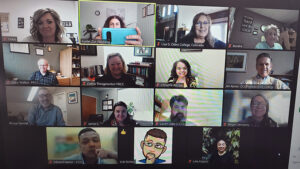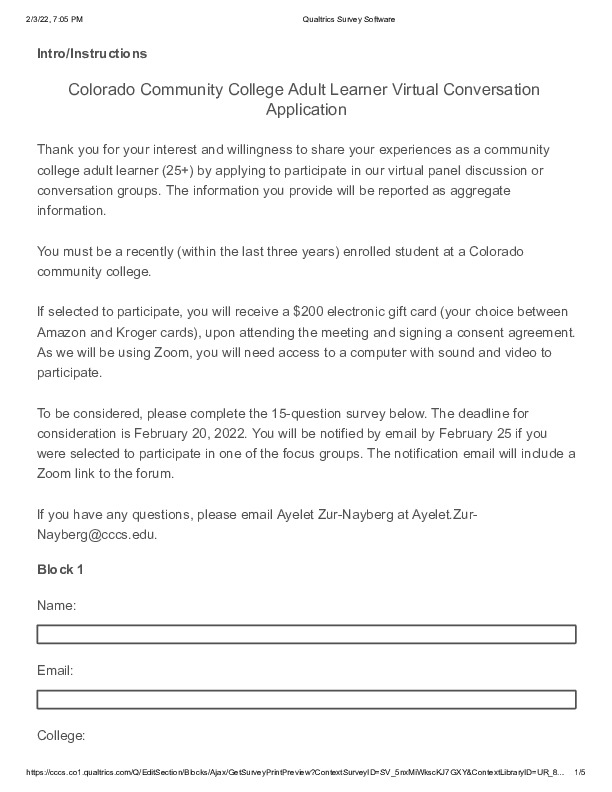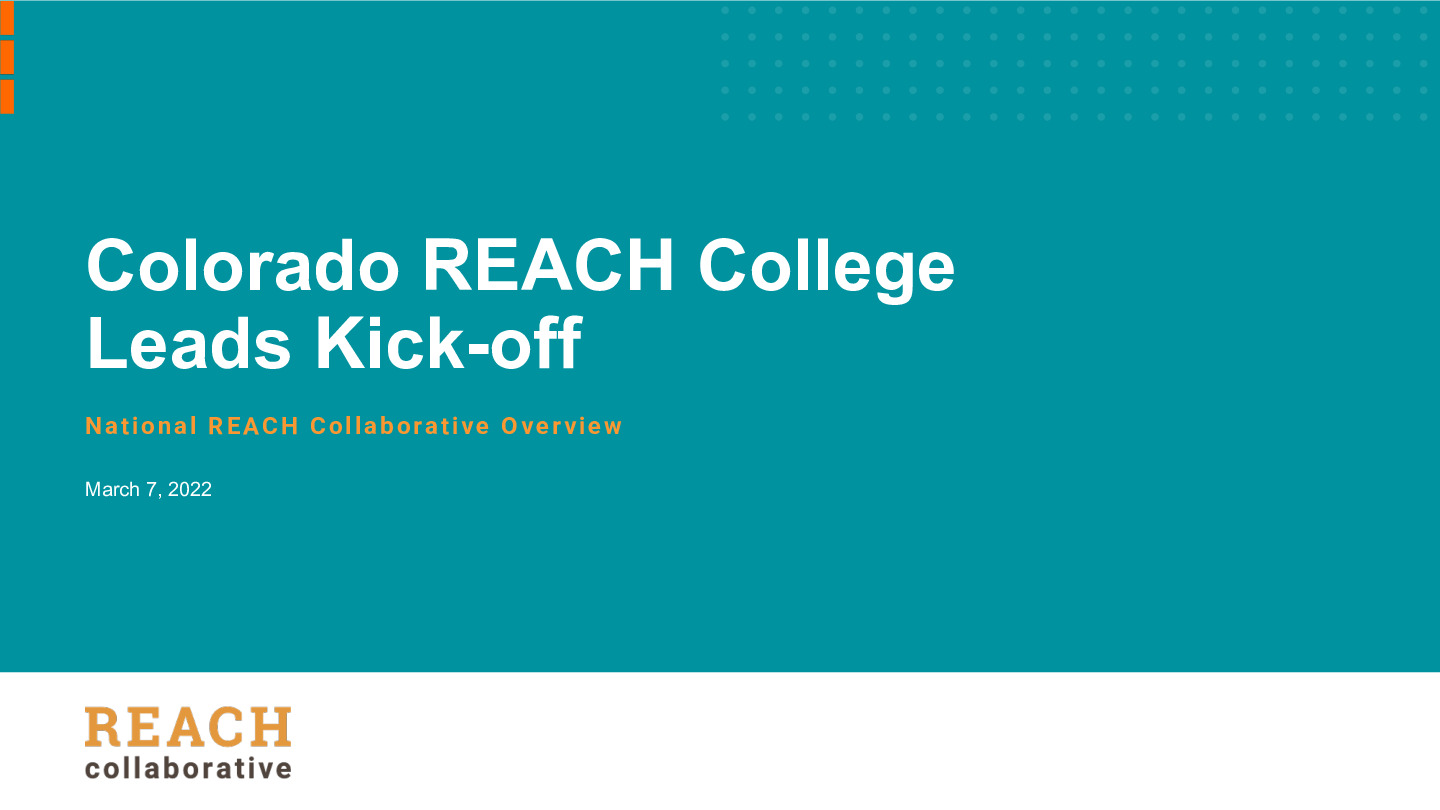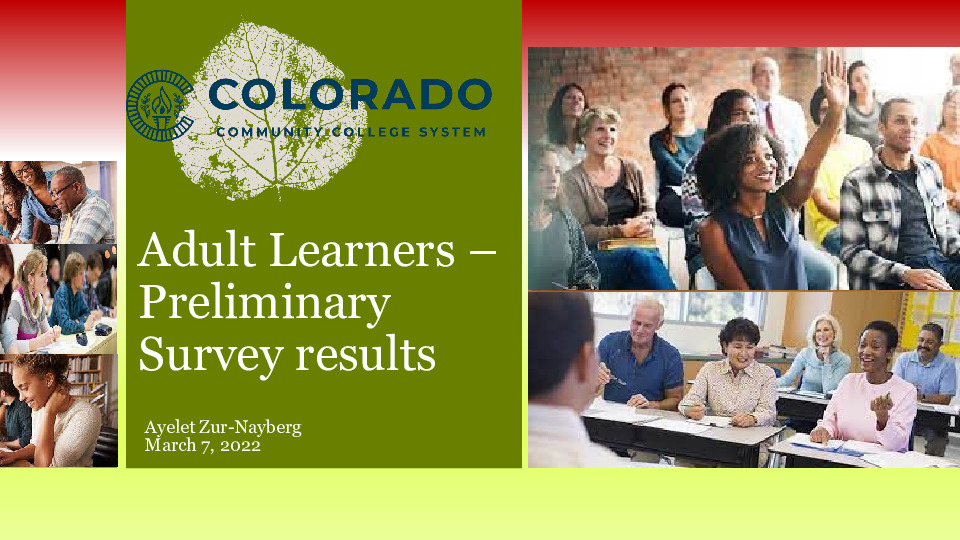2022 Adult Student Success
In October 2018, the State Board for Community Colleges and Occupational Education (SBCCOE) set student success and equity as Colorado Community College System (CCCS) priorities. Based on these priorities, the State Board also approved new and revised Key Performance Metrics to measure student success and equity. Utilizing a variety of data sets at the system level, System staff identified persistent equity gaps in student outcomes, particularly by racial and ethnic demographics. This data was not broken down by student age and did not consider the intersectionality and unique needs of minority adult students.
In July 2021, the CCCS was awarded a Lumina Foundation Grant the focuses on adult learners of color as part of the REACH Collaborative. The Racial Equity for Adult Credentialing in Higher Education (REACH) Collaborative has awarded grants to six states to develop systemwide strategies that results in a 2% increase in credential attainment for enrolled Black, Hispanic, and Native American ages 25-64 at participating community colleges by 2023. Project funds are to be dedicated to activities related to the following initiative elements:
- Sequenced pathways to degrees
- Credential attainment in both non-degree credentials and associates degrees
- Support state efforts to reach their equity goals
REACH College Team Leads:
| College | Member | Title |
|---|---|---|
| Arapahoe Community College | Jennifer Husum | Associate Dean of Compliance & Equity, Arapahoe Community College |
| Colorado Community College Online | Erik Richter | Teaching Excellence Coordinator, CCCOnline |
| Colorado Northwestern Community College | Nikki Robinson | Adult Ed/Career Navigator |
| Community College of Aurora | Megan Dempsey | Student Parent Navigator/Project Manager, Community College of Aurora |
| Community College of Denver | Edward Nance | Director of Admissions, Recruitment, and Outreach, Community College of Denver |
| Front Range Community College | Deb Throgmorton | Interim Dean of Instruction, Online Learning, Front Range Community College |
| Lamar Community College | Kendra King | Cosmetology Program Director, Lamar Community College |
| Morgan Community College | Steven Norton | Title V Director, Morgan Community College |
| Northeastern Junior College | Jamie Giacomini | Director of Family Literacy & Community Education, Northeastern Junior College |
| Otero College | Lisa Gallegos | Academic Support and Grant Project Coordinator, Otero College |
| Pikes Peak Community College | Gary Walker | Director of Prior Learning Assessment, Pikes Peak Community College |
| Pueblo Community College | Perry Pepper | Director of Academic Services, Pueblo Community College – Southwest Campus |
| Red Rocks Community College | Wendy Bird | Dean of Academic Affairs |
| Trinidad State College | Jim Kynor | Valley Campus Vice President, Trinidad State College |

Adult Learners Success Mini-Grant Application
Grant Applications are due by September 12, 2022 and should be submitted via email to ayelet.zur-nayberg@cccs.edu.
- Please add in the subject line: “Adult Learners Success Mini-Grant Application.”
- Late applications will not be accepted.
- Questions can be directed to Ayelet Zur-Nayberg, zur-nayberg@cccs.edu.
For consistency of appearance, all applications should use 11-pt, Calibri font with 1-inch margins. College letterhead and logos may be used to individuate each application. Use the following naming conventions:
AYXX <COLLEGE ABBREVIATION> ALS Mini-Grant Application
Example: AY23 CCCS ALS Mini-Grant Application
Timeline
• August 3, 2022, 1:00-2:00 pm – The first webinar to answer questions about the grant – Zoom Meeting: https://us02web.zoom.us/j/82181419298
• August 11, 2022, 1:00-2:00 pm – The second webinar to answer questions about the grant – Zoom Meeting: https://us02web.zoom.us/j/82488310521
• September 12, 2022 – Grant application period closes
• September 13‐September 19, 2022 – Application screening by the review committee
• Week of September 19, 2022 – Review committee meets to rank and decide on applications to fund
• Week of September 25, 2022 – Notifications to applicants about their application
• Early-Mid October 2022 – Funds available to awardees
Definitions
- Adult Learners: Students who are 25-year-old or older.
- Adult Learners of Color: African American/Black, Hispanic, or Native American adult learners.
- Equity: The creation of opportunities for historically underserved populations to ensure equal access to and participation in educational programs that are capable of closing gaps in student success and completion (Association of American Colleges and Universities).
- Equity‐mindedness: A demonstrated awareness of and willingness to address equity issues among institutional leaders, faculty, and staff (Center for Urban Education, University of Southern California).
- High wage: Earn at least 50% more than the average wage in your service area.
- In-demand: Occupations display high rates of projected growth, have a high frequency of job postings, have a high concentration of jobs in the local region, and are aligned with emerging technology.
- Living wage: Earn a wage at which a person’s basic needs (food, shelter, transportation, healthcare) can be met according to MIT Living Wage Calculator: https://livingwage.mit.edu/states/08/locations
- Meaningful employment: employment opportunity in an in-demand industry that pays above the living wage.
Purpose
CCCS institutions are invited to submit applications for mini grants to increase credential completion for adult learners (25 and older) who are African American, Hispanic, or Native American by at least 2% by Spring, 2023. This 18-month, $500K mini-grant initiative is funded through a grant from the Lumina Foundation as part of its REACH Collaborative to build academic pathways for adult learners of color into high demand, high wage occupations. This grant initiative provides an opportunity for colleges to apply for dollars to fund initiatives and pilot project that support this goal. Proposals must meet the defined project criteria and demonstrate how the intended reforms will contribute to the initiative’s credential completion goal, supports the target population. This grant may also be used to complement institutional efforts to support adult learners of color through the Teaching Excellence Grant work.
Due to the duration of the grant, the focus should be currently enrolled students at your institutions who can, realistically, complete their credentials by the spring 2023 semester, students that have earned short-term/non-degree credentials and can transition into associate/bachelor’s degree programs, or recruitment of new minority adult students to short-term certificates (up to one-year) that could lead to meaningful employment (e.g., emergency services certificates). Grant dollars should be part of a larger institutional effort for transformational change aimed at closing equity gaps in credential attainment in in-demand, high-wage programs.
This mini-grant opportunity is designed to assist the colleges in accomplishing their identified next steps. Colleges are encouraged to apply for mini grants to assist them in deploying student success initiatives aimed at supporting adult learners of color. Mini grants can be contextualized to address the unique institutional context related to student populations served, institution size, and regional industry and community needs.
The mini grants will be administered by CCCS. Colleges will have significant freedom to identify the student success approaches that they deem appropriate. Institutions selected will participate in the larger Colorado REACH collaborative where they will share project progress, lessons learned and key challenges. Outcomes from projects will help inform additional institution and system level strategies that will result in sustainable efforts to increase credential attainment for adult learners of color.
Colleges may use the mini grant to pilot initiatives to help increase credential completion for adult learners who are African American, Hispanic, or Native American, in the next 18 months, and must include timeline and assessment tools to measure the success of the pilot.
Criteria
I. Proposals must include a work plan with explicit timeline, strategies and actions that target increasing credential completion for adult learners (25 and older) who are African American, Hispanic, or Native American by June 2023.
II. Colleges funded through this grant program will be required to collect student feedback, gather disaggregated student success data by race/ethnicity and age that illustrates the extent that the grant demonstrates achievement of equitable student outcomes for adults.
III. Institutions will be expected to present results at the Summer Intensive Teaching and Learning Institute (expected to be in summer 2023).
IV. Institutions awarded funds will also be expected to participate in other REACH Collaborative activities coordinated by CCCS and the national REACH Collaborative
V. Institutions will be expected to explore and develop plans for sustainable strategies for ensuring equitable access and success in high-demand, high-wage program pathways.
VI. Colleges funded through this grant program will be required to submit a final report of the grant program to the CCCS System Office when the grant dollars are expended.
VII. Applications must be approved by college administration before submission.
VIII. Cross‐college grant applications will be accepted and considered. Support from each college administration is required.
IX. Grant ranges vary depending on the scope of the grant.
a. Single college department – up to $20,000
b. Multiple departments and/or college‐wide – up to $40,000
c. Multi‐college – up to $100,000
Adult Student Success Informational Sessions
Session 1
• August 3, 2022, 1:00-2:00 pm – First webinar to answer questions about the grant – Zoom Meeting: https://us02web.zoom.us/j/82181419298
Session 2
• August 11, 2022, 1:00-2:00 pm – Second webinar to answer questions about the grant – Zoom Meeting: https://us02web.zoom.us/j/82488310521
Meeting March 7, 2022 Meeting Agenda


